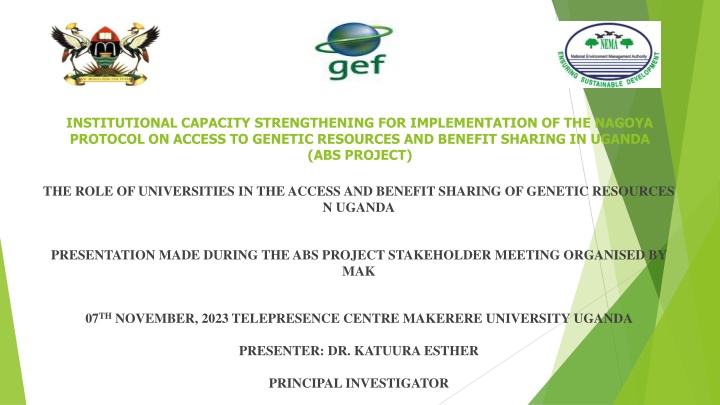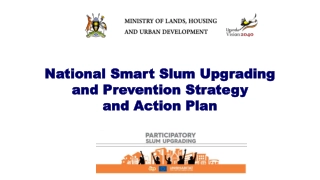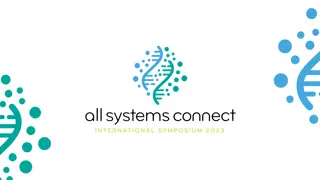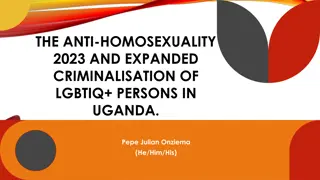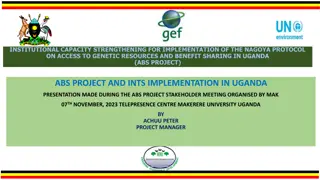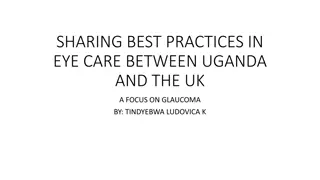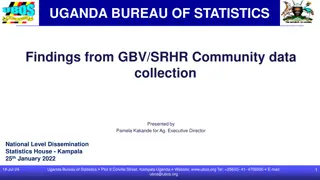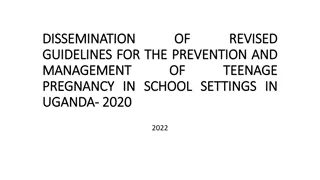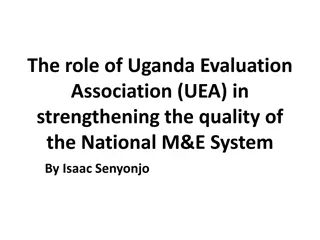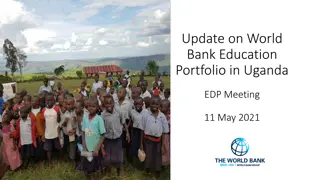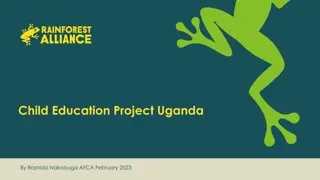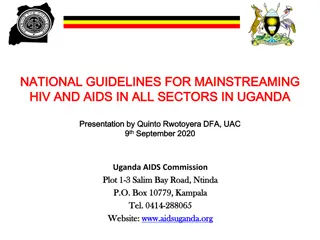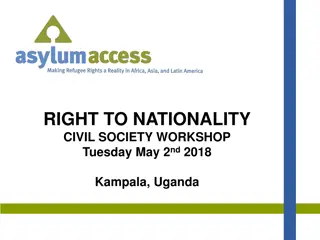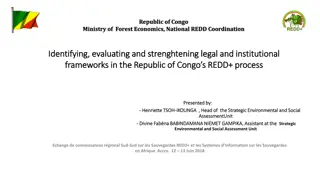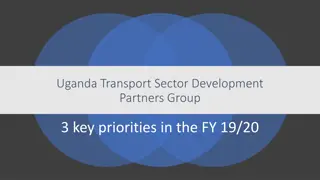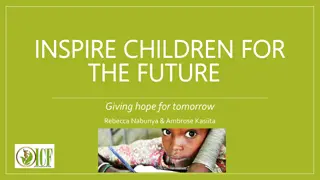Strengthening Institutional Capacity for ABS Project in Uganda
Role of universities in access and benefit sharing of genetic resources in Uganda as presented during the ABS project stakeholder meeting at Makerere University. Makerere University's vision, mission, and strategic goals in training, research, and societal transformation. Current perspectives on education quality, research impact, and influence. Overview of the Nagoya Protocol on access and benefit sharing of genetic resources in line with the CBD objectives.
Download Presentation

Please find below an Image/Link to download the presentation.
The content on the website is provided AS IS for your information and personal use only. It may not be sold, licensed, or shared on other websites without obtaining consent from the author.If you encounter any issues during the download, it is possible that the publisher has removed the file from their server.
You are allowed to download the files provided on this website for personal or commercial use, subject to the condition that they are used lawfully. All files are the property of their respective owners.
The content on the website is provided AS IS for your information and personal use only. It may not be sold, licensed, or shared on other websites without obtaining consent from the author.
E N D
Presentation Transcript
INSTITUTIONAL CAPACITY STRENGTHENING FOR IMPLEMENTATION OF THE NAGOYA PROTOCOL ON ACCESS TO GENETIC RESOURCES AND BENEFIT SHARING IN UGANDA (ABS PROJECT) THE ROLE OF UNIVERSITIES IN THE ACCESS AND BENEFIT SHARING OF GENETIC RESOURCES N UGANDA PRESENTATION MADE DURING THE ABS PROJECT STAKEHOLDER MEETING ORGANISED BY MAK 07THNOVEMBER, 2023 TELEPRESENCE CENTRE MAKERERE UNIVERSITY UGANDA PRESENTER: DR. KATUURA ESTHER PRINCIPAL INVESTIGATOR
The Role of tertiary institutions in training and Research: A case of Makerere University Vision: Makerere University is a thought leader of knowledge for societal transformation and development Mission: Makerere University is committed to providing transformative and innovative teaching, learning, research and services responsive to dynamic national and global needs Strategic goals: a) overall strategic goal: Leadership in high quality programmes responsive to market needs B) School strategic goals To provide knowledge and facilitate learning To conduct research, promote scholarship and publicise knowledge To encourage corporate social responsibility through outreach programmes
Current Perspective Our regional influence and long standing time in the education arena gives us an edge to provide high quality education to our students as we continue on our way to be recognised as one of the great Universities in the world. Beyond academia, our research impact be it academic and economic has led to development of lives and culture of ordinary people, knowledge exchange and an influence on the country's economy. Department of Plant Sciences, Microbiology and Biotechnology, School of Biosciences, College of Natural Sciences teaches the bulk of basic and to some extent applied science in plant and animal genetic resources
International guideline-Nagoya protocol in access and benefit sharing of genetic resources The Nagoya protocol on Access to Genetic Resources and the fair and equitable sharing of benefits arising from their utilisation to the CBD Aims to ensure that owners or guardians of genetic resources receive a fair share of any benefits that arise from research conducted with those resources Objectives: The conservation of Biodiversity The sustainable use of its components The fair and equitable sharing of the benefits arising from the use of the genetic resources
Challenges and opportunities Most indigenous knowledge systems, practices and values, disappear due to the influence of technology, human migrations, climate change, globalisation, death, memory loss and civilisation. There is an opportunity to preserve indigenous knowledge using digital technologies In most African countries, institutions to safeguard the rights of indigenous knowledge holders are so porous There is lack of coordination between formal research and institutions and the local communities that hold and use traditional knowledge Preserving indigenous knowledge using digital technologies;
Opportunities Indigenous people and their knowledge have been realised formally by the UN IK could be a source of solution for contemporary issues Upgrading curricula to include ABS- and Nagoya protocol related issues is one of the main strategies the project sis undertaking
objectives To define the required training level for ABS programme and teaching Resources (Physical, human, logistical, and financial. To develop or update the curriculum content to include ABS competencies To enrich/update the teaching notes to reflect ABS competencies in case of topics already available in the present curriculum To provide an approved draft curriculum by the University administration. The output and outcome of the project is to build capacity of professionals in ABS issues as well as updated curricula that will churn out informed researchers and a general workforce on ABS issues.
Target curriculum to be improved Programmes in PMB BSc Applied and Economic Botany-Dr. Nabatanzi Alice BSc in conservation biology-Dr. Ojelel Samuel Bachelors of Biotechnology- Dr. Sadik Mustafa Masters in Botany-Dr. Ssenku Jamilu Masters in Genetics-Dr Nsubuga Masters in plant pathology and crop Science- Dr. Shahasi Athman Masters in Economic Botany- Dr. Tugume Patience
Conclusion The project will strengthen institutional capacities for the effective implementation of the Nagoya Protocol and develop curriculum covering ABS issues and concerns in Uganda. The meeting will expose, the Nagoya Protocol on ABS and its implementation in Uganda; the Role of higher institutions of learning in ABS Mechanisms; national regulatory mechanisms and Indigenous People and Local Communities and Access to Genetic Resources and Management among others.
